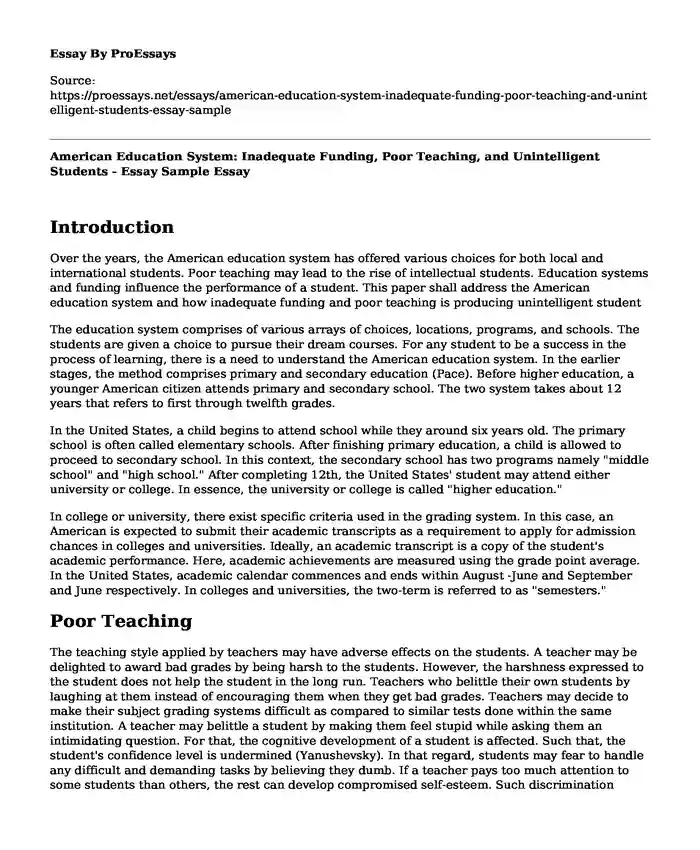Introduction
Over the years, the American education system has offered various choices for both local and international students. Poor teaching may lead to the rise of intellectual students. Education systems and funding influence the performance of a student. This paper shall address the American education system and how inadequate funding and poor teaching is producing unintelligent student
The education system comprises of various arrays of choices, locations, programs, and schools. The students are given a choice to pursue their dream courses. For any student to be a success in the process of learning, there is a need to understand the American education system. In the earlier stages, the method comprises primary and secondary education (Pace). Before higher education, a younger American citizen attends primary and secondary school. The two system takes about 12 years that refers to first through twelfth grades.
In the United States, a child begins to attend school while they around six years old. The primary school is often called elementary schools. After finishing primary education, a child is allowed to proceed to secondary school. In this context, the secondary school has two programs namely "middle school" and "high school." After completing 12th, the United States' student may attend either university or college. In essence, the university or college is called "higher education."
In college or university, there exist specific criteria used in the grading system. In this case, an American is expected to submit their academic transcripts as a requirement to apply for admission chances in colleges and universities. Ideally, an academic transcript is a copy of the student's academic performance. Here, academic achievements are measured using the grade point average. In the United States, academic calendar commences and ends within August -June and September and June respectively. In colleges and universities, the two-term is referred to as "semesters."
Poor Teaching
The teaching style applied by teachers may have adverse effects on the students. A teacher may be delighted to award bad grades by being harsh to the students. However, the harshness expressed to the student does not help the student in the long run. Teachers who belittle their own students by laughing at them instead of encouraging them when they get bad grades. Teachers may decide to make their subject grading systems difficult as compared to similar tests done within the same institution. A teacher may belittle a student by making them feel stupid while asking them an intimidating question. For that, the cognitive development of a student is affected. Such that, the student's confidence level is undermined (Yanushevsky). In that regard, students may fear to handle any difficult and demanding tasks by believing they dumb. If a teacher pays too much attention to some students than others, the rest can develop compromised self-esteem. Such discrimination makes the students become thwarts with a reduced confidence level. Also, if a teacher focuses mainly on bad grades or performance without rewarding best performance, the student may develop a negative attitude towards the subject.
If a teacher belittles student's efforts on specific subjects, a student may be discouraged from working hard. In this context, students may develop the feeling that their efforts do not add any value. For that reason, poor teaching may produce unintelligent students.
Poor Funding
Some schools may be lowlily equipped with resources making research and other extensive studies difficult. For instance, a school that has advanced technology usually produce top-quality professionals compared to schools with inadequate technological facilities. If a school is poorly funded, teachers are not motivated to work in such an environment (Yanushevsky). In essence, if a teacher's morale is very low, the level of productivity becomes very low. Therefore, teachers may offer poor services to the students.
Funding is critical for student performance. For instance, increased spending on learning contributes to better student results. If a state invests in its public schools by creating adequate, equitable finance systems are enhanced. Student performance arises by making a positive impact on students from low-income families (Pace). A high quality early learning childhood program s can be realized by spending wisely on evidenced-based interventions.
Students from low- income earning communities can only pursue less access to the core academics services by increasing the student results. Funding is needed to improve exposure to rigorous performance, quality teachers, and early childhood education (Pace). Funding from federal, state and district governments plays a significant role in ensuring equity in learning.
Conclusion
In conclusion, the education system comprises of various arrays of choices, locations, programs, and schools. Before higher education, a younger American citizen attends primary and secondary education. If a student has finished the primary education, the student is allowed to proceed to secondary school. In this context, the secondary school has two programs namely "middle school" and "high school." After completing 12th, the United States' student may attend either university or college. University or college is called "higher education". Funding is critical for student performance. Such that increased spending on learning contributes to better student results. If a state invests in its public schools by creating adequate equitable finance systems.
Works Cited
Pace, Frank. System vs. Culture: North American Education and Society in the Balance. FriesenP, 2014.
Yanushevsky, Rafael. Improving Education in the US: A Political Paradox. Algora Publishing, 2011.
Cite this page
American Education System: Inadequate Funding, Poor Teaching, and Unintelligent Students - Essay Sample. (2023, Mar 14). Retrieved from https://proessays.net/essays/american-education-system-inadequate-funding-poor-teaching-and-unintelligent-students-essay-sample
If you are the original author of this essay and no longer wish to have it published on the ProEssays website, please click below to request its removal:
- History Curriculum and Pedagogy
- What is Language? - Essay Sample
- Challenges That Early Childhood Educators Face Essay
- Findings of 2 Research Articles on Sociolinguistic Theory Paper Example
- UAE University of Abu Dhabi 2019 Graduation Ceremony - Essay Sample
- Paper Example on Action Research: Understanding & Improving School Quality
- The Purpose of College Education: Exploring its Impact in Society - Essay Sample







